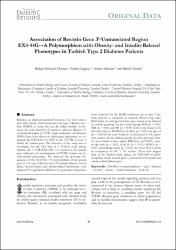Association of resistin gene 3'-untranslated region EX4-44G-->A polymorphism with obesity- and insulin-related phenotypes in Turkish type 2 diabetes patients.
Künye
Duman BS, Cagatay P, Hatemi H, Ozturk M. Association of resistin gene 3'-untranslated region EX4-44G-->A polymorphism with obesity- and insulin-related phenotypes in Turkish type 2 diabetes patients. Review of Diabetic Studies. 2007; 4(1): 49-55. doi 10.1900/RDS.2007.4.49Özet
Abstract Resistin, an adipocyte-secreted hormone, has been associated with obesity, insulin resistance and type 2 diabetes mellitus (T2DM) in some, but not all, rodent models. In humans, the exact function of resistin is unkown. Because 3'-untranslated region (3'-UTR) single nucleotide substitutions (SNPs) have been shown to affect gene expression, we examined the EX4-44G-->A SNP in the 3'-UTR of exon 3 within the resistin gene. The objective of this study was to investigate, for the first time in a Turkish study group, whether the 3'-UTR EX4-44G-->A variation in the resistin geneinfluences the development of T2DM, obesity and insulin-related phenotypes. We analyzed the genotype frequencies of the EX4-44G-->Apolymorphism of the resistin gene in 116 type 2 diabetic and 102 normal subjects. Serum lipids, obesity-related and insulin-related phenotypes were analyzed. No significant difference for genotypic frequencies were observed for the BseRI restriction site in type 2 diabetic patients as compared to controls. Waist-to-hip ratio, BMI, body fat and apoAI levels were found to be affected by resistin genotype. In the control group, BMI (p < 0.01), HIS (p < 0.05) and BF (p < 0.05) levels were found to be elevated, whereas HOMA beta-cell index (p < 0.01) and apo AI (p < 0.05) levels were found to be decreased in GG genotype carriers. In the diabetic group, the GG genotype carriers were found to have higher BMI levels (p < 0.001), waist-to-hip ratio (p < 0.05), body fat (p < 0.01), HOMA (p < 0.001) and fasting insulin (p < 0.05), but lower HbA1c levels in comparison to GC + AA carriers. These data suggest that, in the Turkish study group, the EX4-44G-->A polymorphism of the resistin gene is associated with insulin and obesity-related phenotypes.
Kaynak
Review of Diabetic StudiesCilt
4Sayı
1Bağlantı
https://hdl.handle.net/11446/692http://www.soc-bdr.org/content/rds/archive/4/1_spring/original_data/resistin_gene_polymorphism_and_type_2_diabetes/?showfulltext=1


















